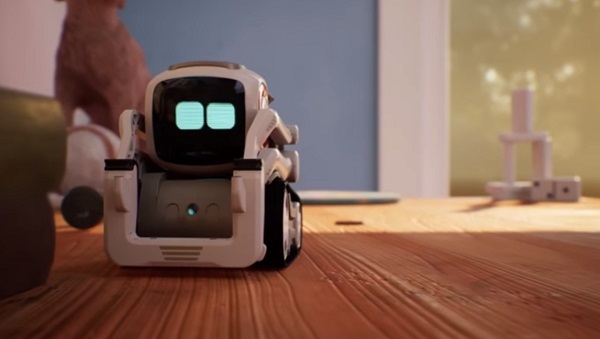
New animated series ‘Cozmo & Friends’ stars Digital Dream Labs’ tiny robot
In late 2019, Digital Dream Labs finalized a deal to acquire the rights to miniature robots from Anki, a Silicon Valley company going bankrupt. Founder and CEO Jacob Hanchar thought the tiny robots, Cozmo and Vector, filled a product need for his Pittsburgh-based ed-tech company.
“The worst-case scenario was we’ll make Cozmo robots, and we will just teach programming, and it will be introduced to schools that are our clients,” Hanchar says.
Hanchar didn’t expect Cozmo to attract attention from a video company that intends to make the cute little robot a global phenomenon. Sutikki, the company responsible for the UK children’s series ”Moon and Me,” reached an agreement with Digital Dream Labs to produce an animated series starring Cozmo.
The show, “Cozmo & Friends,” recently debuted on YouTube and is poised to become an entertainment franchise.
“An analogy I would use is it’s like what Mr. Rogers did with Daniel Tiger, using animated content to engage young and early learners,” Hanchar says. “Only in this case, to engage them in robotics.”
Sutikki’s plans include engaging tech-savvy kids through video content and merchandising that will coincide with Digital Dream Labs’ updated versions of Cozmo and Vector coming out this spring.
“Cozmo is an extraordinary character, who is not only an educational asset and friend for children, but also full of play and exploration,” says Hannah Mungo, CEO of Sutikki.
“Stereotypically, you get boys who are interested in robots,” Hanchar says. “With Cozmo, it’s 50-50 boys and girls. That just tells you the amazing appeal this robot has. It cuts across everything, and I see it eventually as a major uniter in the field of robotics to engage every person from every corner of the planet.”
The personable little robot was popular when purchased by Dream Digital Labs. Launched in 2017 by Anki, Cozmo was the best-selling toy for two consecutive years on Amazon in the US, and Amazon’s best-selling toy in England and France in 2017. While it’s an instructional toy that teaches the basics of robotics, Cozmo also functions as a game-playing machine and performs tricks, broadening its appeal.
Cozmo’s counterpart, Vector, is similarly constructed. But Vector is also marketed to adults and serves as an intuitive robot that can act as a scheduler, timer, and even a companion.
“Some people just use him as a desktop pet and he just hangs out on your desk while you’re at work and keeps you company,” Hanchar says. “However, on the other end of the spectrum, there are people who program him to come up with various robotic acts. He spans the gamut, and what is so fascinating about Vector is how deep his technology goes and how much he appeals to a broad range of people.”
Hanchar says the average age of Vector users is 21 – compared to 10 years for Cozmo — and that the robot has been helpful for those suffering from PTSD, especially veterans.
One part of the agreement after Digital Dream Labs acquired Cozmo and Vector was to keep service for both robots active.
“As soon as we did that, there was an outpouring of support from people (who use Vector) all over the world,” Hanchar says. “They said it was more than just a robot to them. … As far as mental health and mental wellness go, Vector plays a very important part in daily lives.”
New models of Cozmo and Vector are not only being upgraded but are being built “all over from scratch,” Hanchar says. Improvements include better cameras and facial recognition and interchangeable parts that fit both models. Pre-orders are being accepted at the Digital Dreams Labs website, with delivery slated for May or June 2021.
While Hanchar is proud of his company’s success, he’s also delighted that it’s happening in Pittsburgh. A native of Johnstown who went to high school in Bellefonte, Centre County, and graduated from Penn State, Hanchar thinks that Digital Dream Labs proves that successful tech start-ups can happen anywhere.
“I see this as a victory for Pittsburgh,” Hanchar says. “You have the blue-collar work ethic of a small crack veteran team without big Silicon Valley dollars getting this done. I really think it’s a Pittsburgh story, and I want to be Pittsburgh-proud about it.”

